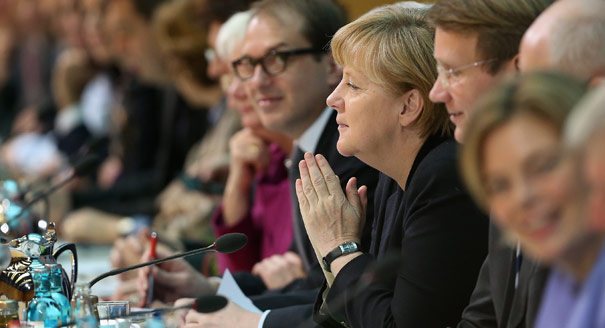Last Monday night, Chancellor Angela Merkel’s conservative bloc and her new coalition partners, the Social Democrats, signed off the foreign and defense chapter of their new coalition agreement.
Such documents are always worth a close read as they spell out what the new government is planning to do over the next four years.
But if anyone was hoping that Merkel would use her position as Europe’s most powerful leader to push European integration forwards, they will be sorely disappointed. The coalition treaty sets out few new ideas for Germany’s foreign and defense policy. This is not good news for Europe or the transatlantic relationship.
The three most glaring weaknesses of the document concern defense, European security, and NATO.
Germany’s armed forces are now in their third year of restructuring after conscription was abolished in 2011. And while the coalition accord contains many soothing words about improving living conditions for soldiers, there is little attention given to the threats and challenges that the Bundeswehr will have to face.
Also, there is a complete refusal to deal with the sensitive issue of armed unmanned aerial vehicles, or drones. In three carefully worded paragraphs, Germany’s conservatives and Social Democrats simply agree to postpone any decision concerning these weapons.
Drones have a terrible reputation among Germans because of their use in U.S. attacks on alleged terrorists in Pakistan, Afghanistan, and Yemen. Yet Germany’s new leadership refuses to acknowledge the fact that drones are now a part of the modern military kit and can serve to protect soldiers’ lives.
Another issue that does not get enough attention is European security. It is all very well proposing that the European External Action Service improves its crisis management, or that the EU sets out its foreign and security priorities. But how? And what priorities would Berlin endorse? No answers are given. And while the document does mention the need for more “pooling and sharing” of European military resources, it ignores the fact that, so far, Germany has been highly reluctant to do just that.
The section on NATO is shamefully shallow. Every defense minister and security expert in Europe or America knows that NATO is in for a major debate about its future once its military mission in Afghanistan is over. That, plus the United States’ waning interest in the alliance, are issues that continue to be ignored in Germany.
So is there anything that really stands out in this coalition document? There are several paragraphs devoted to values and human rights that are laudable. There is an interesting section, too, on dealing with countries that produce the raw materials and rare earth minerals so desperately needed by Germany’s electronics and car industries. That particular section stresses the need for transparency as well as sustainable development and environmental policies. Here, there really is an attempt to reconcile values and interests.
There is also much attention given to the Middle East, Israel, Iran, and arms control without adding anything fundamentally new.
The most interesting bits of the accord are the foreign policy sections on Poland and Russia. It is striking that Poland is given more attention than France, a detail that confirms the poor relationship between Merkel and France’s President François Hollande. For Poland, there are concrete proposals for deepening the relationship between Berlin and Warsaw. This is entirely in line with Merkel’s earlier policy of recognizing Poland’s importance for Berlin and Europe as well as for Russia.
The section on Russia is equally revealing. It is easy to detect Merkel’s influence in the frequent references to strengthening civil society in all its aspects. There is criticism of corruption, of the weak rule of law, and of the direction Russia is taking. Germany will continue to engage Russia and support a new partnership accord but not at any price. Merkel wants “much more coherence” in the EU’s policy toward Russia. She also wants to deepen the trilateral dialogue between Poland, Germany, and Russia.
Both positions suggest that the decades-long special relationship between Berlin and Moscow that Russia so often used to divide Europe is finally ending. They also indicate that Merkel could use her third term in office to finally decide on a long-term strategy toward a Russia that still has President Vladimir Putin firmly ensconced in the Kremlin.
Of course, it would have been a welcome surprise to see Germany’s new government engage in strategic thinking on the great issues of European integration and defense. Failing that, a serious effort to help draw up a new EU approach to Russia is certainly worthwhile.






